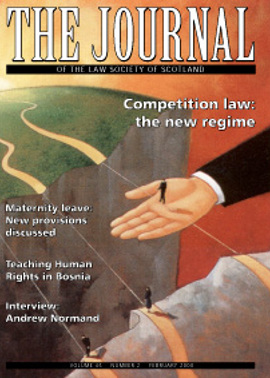Evolving procedures of the parliament
Since the Parliament first met on 12th May it has operated under a set of standing orders conferred upon the Parliament by a statutory instrument made by the Secretary of State for Scotland.
The Procedures Committee was given the task of proposing a new draft set of standing orders before 6th May 2000. It presented its proposals to the Parliament six months early on 9th December 1999.
These proposals built on the existing standing orders and brought forward changes in those areas in which members and clerks had detected difficulties in practice. It has recommended significant amendments to the standing orders, in particular those in relation to Question Time.
Question Time
Question Time is a key event in the parliamentary week and attracts much public and media interest. It did not get off to the best of starts, but it did improve as members became more familiar and comfortable with the format.
However, there was clearly a need to adjust the proceedings in order to improve Question Time as a means of holding the Executive to account. The Procedures Committee therefore recommended that the total time allotted to questioning Ministers should be increased from 45 minutes to one hour. A specific First Minister’s Question Time was also recommended which would last for up to twenty minutes out of the hour. Members would also be given more chance to pursue topics with Ministers through supplementary questions.
To further improve Question Time, the Committee recommended that the deadline for questions for First Minister’s Question Time should be three days before the event, rather than eight days as for Question Time. This should ensure that questions are more topical and therefore of greater interest. The number of questions to the First Minister selected by the Presiding Officer could also be increased from three to up to six. The introduction of a specific First Minister’s Question Time is intended to address the concerns of members that they should have the opportunity to question Donald Dewar weekly as this is a key element of accountability.
The First Minister agreed that this should be the case and it is hoped that this will improve the standing of the Parliament in the eyes of the public.
CommitteesCommittees of the Scottish Parliament play a much more significant role than those at Westminster and they are the means by which individual MSPs, outside bodies or the public can bring maximum influence to bear in the Parliament.
At Westminster, different types of committee perform different functions. Standing Committees process legislation and Select Committees scrutinise the work of Government departments and conduct investigations.
The Committees of the Scottish Parliament are multi-functional. The subject committees, which cover the departments of the Scottish Executive, have a legislative role to process legislation and also to initiate legislation themselves; an investigatory role to conduct inquiries into subjects that they believe warrant such action and come up with reports recommending policy action; and a scrutiny role to examine the work of the Executive departments.
However, there is growing concern that this committee system will not be able to cope with all the different tasks that it is being asked to perform. A recent example of this is the attempt by the Executive to move consideration of the National Parks Bill from the Transport and Environment Committee to the Rural Affairs Committee. This is to make room for the Executive’s highly contentious Transport Bill to be discussed in the Transport and Environment Committee.
This has serious implications for the speed at which the Parliament can process legislation. The Justice and Home Affairs Committee is by far the busiest committee with the Adults with Incapacity Bill, Abolition of Feudal Tenure Bill, Land Reform Bill and Tommy Sheridan’s Member’s Bill to abolish warrant sales to be considered. In addition, further Bills are expected on freedom of information, family law and domestic violence, which would all have to go through the Justice and Home Affairs Committee.
One of the main arguments in favour of the Scottish Parliament was the lack of legislative time available at Westminster to discuss Scottish legislation. Unless something is done to prevent it, there is a danger that a logjam of legislation will build up in the Scottish Parliament and this will hinder reforms of the Scottish legal system.
This may well require a review and in the case of the Justice and Home Affairs, it may require two committees to cover the subject area.
In this issue
- President's report
- Jumping the gun
- Obituary: Robert Arthur Burgess
- Competition law: the new regime begins
- Teaching human rights in Bosnia
- Does your firm spend more on tea than IT?
- Changes to maternity leave
- Interview: Andrew Normand
- Evolving procedures of the parliament
- Stamp duty soldiers on
- Rights in three dimensions
- Managing environmental risks
- Stay ahead of the game






